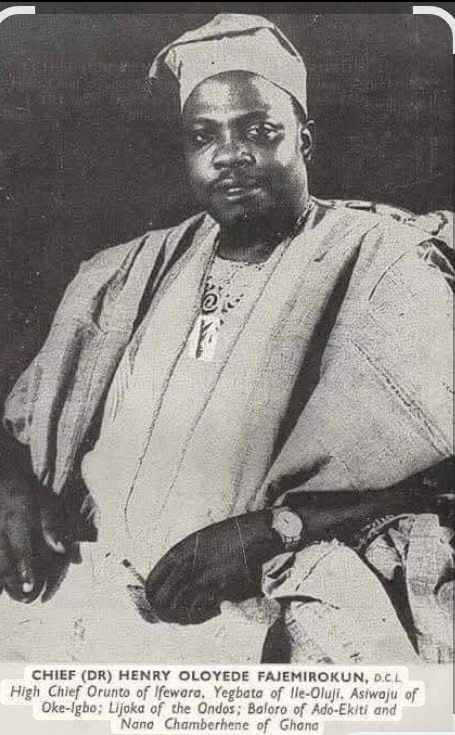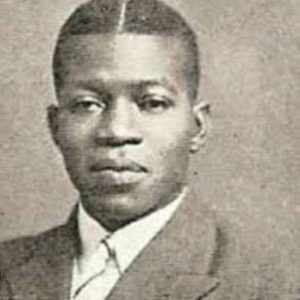How a young trade unionist from Ile-Oluji rose from humble beginnings to become one of Nigeria’s greatest industrial pioneers and business icons.
Chief (Dr) Henry Oloyede Fajemirokun (26 July 1926 – 15 February 1978) stands as one of Nigeria’s most outstanding examples of self-made success. From starting with a small family loan, he built a vast business empire that spanned multiple industries and laid the foundation for indigenous participation in Nigeria’s private sector during the post-colonial era.
Born in Ile-Oluji, present-day Ondo State, Fajemirokun’s journey to prominence was anything but easy. After serving in the Second World War, he returned home to work in Nigeria’s public sector. His leadership qualities quickly emerged, and he became the President of the Post and Telegraph Clerical and Workers Allied Union, advocating for workers’ rights and improved welfare.

A Humble Beginning Turned Business Breakthrough
In 1955, driven by ambition and vision, Fajemirokun borrowed a modest sum from a maternal relative to start his private business. With this small capital, he ventured into agricultural exports, beginning with cattle bones before expanding into hides and skin, cocoa, rubber, coffee, and shea nuts. His reliability and business integrity earned him the trust of international buyers, who later extended him letters of credit—a rare privilege for an indigenous entrepreneur at the time.
Realising the growing opportunities in global trade, Fajemirokun diversified further. By the early 1960s, he became one of Nigeria’s largest importers of cement, sourcing supplies from Egypt and Poland. His success was bolstered by a credit facility provided by a British bank in London a remarkable achievement for a Nigerian businessman during that period.
Building the Henry Stephens Group
In 1962, Fajemirokun expanded his operations by founding a maritime services firm, setting the foundation for what would later evolve into the Henry Stephens Group of Companies. Under his visionary leadership, the conglomerate grew into one of Nigeria’s most influential indigenous business empires, with interests in cement and building materials, engineering, banking, insurance, shipping, ship broking, and oil prospecting.
As founder, chairman, and principal shareholder, Fajemirokun became known not just for his entrepreneurial excellence but also for his insistence that Nigerians take an active role in shaping the nation’s industrial destiny. At a time when foreign companies dominated major industries, he advocated tirelessly for local ownership, empowerment, and economic independence.
Pioneering Nigeria’s First Private Merchant Bank
One of his most significant contributions came through his efforts to establish the Nigerian-American Merchant Bank Limited (NAMBL) Nigeria’s first private merchant bank. He successfully led the negotiations that brought the First Bank of Boston (later the Bank of Boston) into partnership with Nigerian investors. Unfortunately, the bank was formally established after his untimely death in 1978, but the vision and groundwork bore his imprint.
A Legacy of Philanthropy and Honour
Fajemirokun’s influence extended beyond business. His generosity, leadership, and service to humanity earned him numerous chieftaincy titles and honours across the Southwest.
Yegbata of Ile-Oluji (1968)
Asiwaju of Oke-Igbo (1971)
Lijoka of Ondo (1973)
High Chief Orunta of Ifewara (1974)
Obaloro of Ado Ekiti (1977)
In 1972, the University of Ife (now Obafemi Awolowo University) recognised his immense contributions to national development by conferring upon him an Honorary Doctor of Science (D.Sc.) Degree in Business Administration.
Advocating African Economic Unity
Beyond Nigeria, Fajemirokun was also a committed advocate for regional cooperation. He played a notable role in early efforts that later culminated in the creation of the Economic Community of West African States (ECOWAS) a testament to his foresight in promoting economic integration and collective growth across Africa.
A Portrait of Vision and Determination
The iconic portrait of Chief Henry Oloyede Fajemirokun often shared today represents more than a businessman it reflects a visionary leader whose determination, discipline, and integrity transformed him from a small-scale trader into a symbol of indigenous enterprise. His story remains a powerful lesson on how faith, hard work, and foresight can overcome limitations.
Chief Fajemirokun passed away on 15 February 1978, but his legacy continues through the businesses he built, the policies he influenced, and the countless lives he inspired.
Stay ahead with the latest updates!
Join The Podium Media on WhatsApp for real-time news alerts, breaking stories, and exclusive content delivered straight to your phone. Don’t miss a headline — subscribe now!
Chat with Us on WhatsApp






